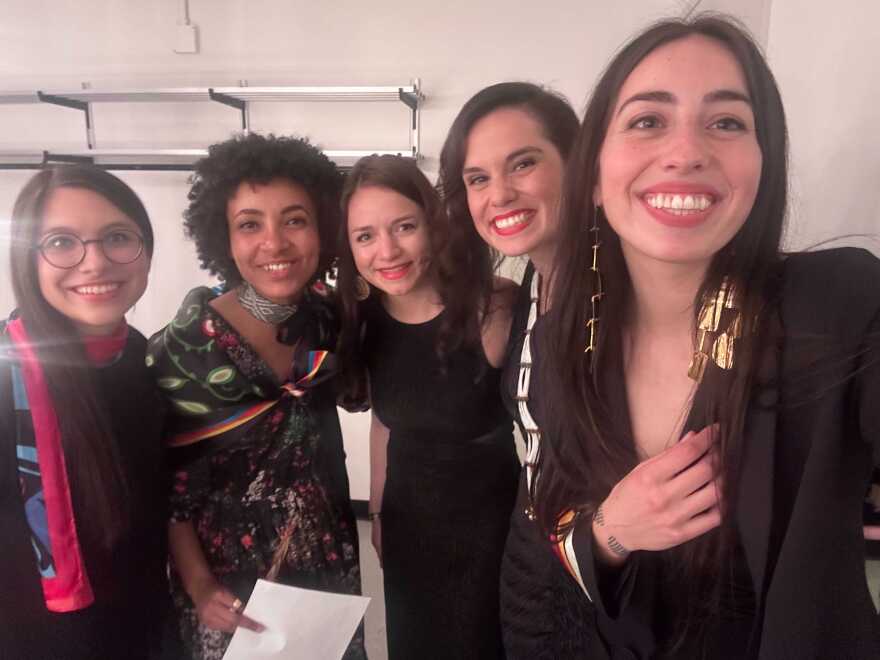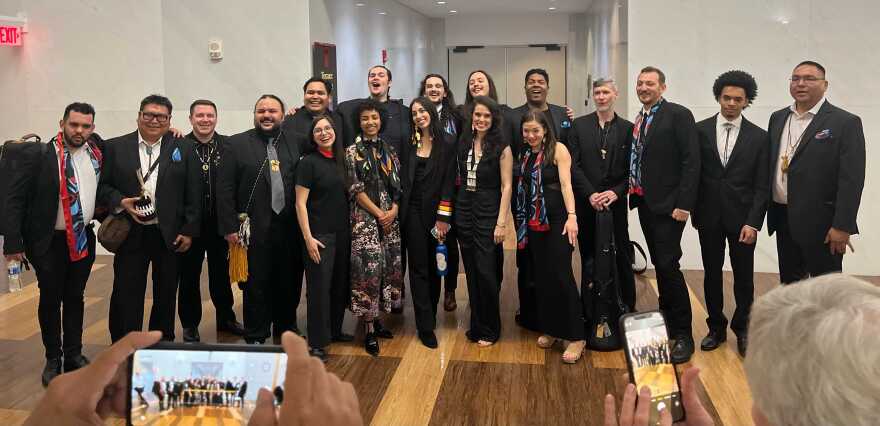Abenaki and other Indigenous perspectives took center stage in the nation’s capital last weekend when the Julia Keefe Indigenous Big Band headlined the Mary Lou Williams Jazz Festival at the Kennedy Center.
The annual festival honors Williams, known as the “first lady of jazz,” and celebrates women who continue to shape the genre. Among them is Julia Keefe, a Nez Perce citizen who leads the Indigenous Big Band, and Mali Obomsawin, an Abenaki citizen of Odanak First Nation who is a bassist in the band.
The 16-person ensemble formed in 2022 thanks to a grant from the regional nonprofit organization South Arts. Keefe says the group is carrying on a precedent particularly visible in Indigenous life in the mid-20th century, when Indigenous jazz icons like Mildred Bailey and “Big Chief” Russell Moore were on the scene.
“We really are trying to honor those great musicians, not only the ones who rose to recognition, but also those that are now nameless,” Keefe says. “We stand on the shoulders of those jazz greats, and we continue that tradition.”

For Obomsawin, the recent jazz festival’s spotlight on Indigenous musicians felt like an endorsement of the importance of their stories — which usually get overlooked.
“We often talk about the big band as, like, more of a movement than just a band. Right?” she says. “And, like, it's a movement to tell the history of Indigenous people in jazz, which is like, written out of the pedagogy completely.”
In addition to the long history of oral traditions among Indigenous peoples, a big part of the origins of Indigenous peoples in jazz goes back to residential schools in the U.S. and Canada.
Those institutions, set up and run by federal policy as well as Christian churches, forcibly removed Indigenous children from their families and stripped away their culture. As part of that process, Obomsawin notes that when the children were taught to perform religious music, they also received marching band instruments.
“But also in sort of the early 1900s, right, like the popular music of the time that was forming was big band music,” she says. “There's actually all of these archival images of Native big bands, and, and small ensembles across Turtle Island.”
That includes L’Harmonie Abénakise, the Abenaki marching band whose photo Obomsawin includes on the back of her 2022 album, Sweet Tooth. In the photo of the all-male ensemble, a drum is visible painted with the year 1915.

Fast forward to May 11, 2024 at the Kennedy Center in Washington, D.C. where Obomsawin and several other femmes performed with the female-led Julia Keefe Indigenous Big Band at the Mary Lou Williams Jazz Festival in front of hundreds of people.
The group also received a five-day residency prior to workshop new music, and they had a special guest during both the residency and the gig: the award-winning jazz musician Esperanza Spalding.
“It was wild,” Julia Keefe says. “The irony wasn't lost on me that this all-Indigenous big band was performing at the Kennedy Center in Washington, D.C., where so many of these federal mandates and genocidal acts and policies were passed and enacted.”
Keefe says her great-grandmother attended Carlisle Indian School in Pennsylvania, and she recently found out that the school sent her great-grandmother to work as a housekeeper and a cook for a rich white family in Washington, D.C.
“A few generations later, you know, her great-granddaughter is conducting her all-Indigenous big band at the Kennedy Center — that history, that family legacy is there, in D.C.,” Keefe says. “And so getting up on that stage, you know, it wasn't just for us. It felt like it was so much bigger. It was like giving, giving voice to my great-grandmother, who was very much stripped of her voice and her agency by this federal government. So it was — it was a huge moment.”

For Mali Obomsawin, whose original compositions “Blood Quantum” and “Wawasint8da” were among the songs the band played at the festival, she says she also found it meaningful — and maybe subversive — to share her perspective as an Abenaki in this space.
“It's such a weird thing, operating at this level as an artist, like, it's — you kind of get to, like, sneak into spaces that like, you know, if you were just a political organizer or something, you would definitely not be allowed to, like, have a platform and say the things that. You do you feel like you're a little undercover,” she says. “We were expelled from our territory that became America. So like, to reclaim something so immense and so personal to me, in the heart of this colony, felt powerful.”
Gaining more of a platform also means the Julia Keefe Indigenous Big Band receives more negative attention, according to Keefe.
“When you do become outspoken as an Indigenous person, that not only will people celebrate you, but they'll also come in and heavily critique you,” Keefe says, noting that some of that critique has been from within Indigenous communities. But, she adds, her focus will be continuing to speak out about government policies harming Indigenous peoples.
“People are gonna just have to get used to our reality, you know?” Obomsawin says. And she says at the Kennedy Center, she felt particularly protected in sharing this reality while surrounded by the Indigenous members of the big band, several of whom offered traditional songs before the show.
“Usually before a gig like, I get so nervous, and that was there too, of course, but like the second that I stepped on stage, I was just, you know, like: ‘We are prepared,’” Obomsawin says. “And not even because we like, shredded the music all week prepared. But we're prepared because our ancestors have been preparing us in our communities, have been preparing us to represent for our entire lives.”
The Julia Keefe Indigenous Big Band expects to perform several more gigs this coming fall, and to have an especially busy spring next year — including a potential performance in Vermont.
Have questions, comments or tips? Send us a message.

